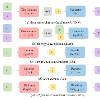Multi-contrast magnetic resonance imaging (MRI) is the most common management tool used to characterize neurological disorders based on brain tissue contrasts. However, acquiring high-resolution MRI scans is time-consuming and infeasible under specific conditions. Hence, multi-contrast super-resolution methods have been developed to improve the quality of low-resolution contrasts by leveraging complementary information from multi-contrast MRI. Current deep learning-based super-resolution methods have limitations in estimating restoration uncertainty and avoiding mode collapse. Although the diffusion model has emerged as a promising approach for image enhancement, capturing complex interactions between multiple conditions introduced by multi-contrast MRI super-resolution remains a challenge for clinical applications. In this paper, we propose a disentangled conditional diffusion model, DisC-Diff, for multi-contrast brain MRI super-resolution. It utilizes the sampling-based generation and simple objective function of diffusion models to estimate uncertainty in restorations effectively and ensure a stable optimization process. Moreover, DisC-Diff leverages a disentangled multi-stream network to fully exploit complementary information from multi-contrast MRI, improving model interpretation under multiple conditions of multi-contrast inputs. We validated the effectiveness of DisC-Diff on two datasets: the IXI dataset, which contains 578 normal brains, and a clinical dataset with 316 pathological brains. Our experimental results demonstrate that DisC-Diff outperforms other state-of-the-art methods both quantitatively and visually.
翻译:多对比度磁共振成像(MRI)是基于脑组织对比度的神经学疾病诊断和管理工具。然而,获得高分辨率MRI扫描是耗时的,在特定条件下是不可行的。因此,已经开发了多对比度超分辨率方法,通过利用多对比度MRI的互补信息提高低分辨率对比度的质量。当前基于深度学习的超分辨率方法在估计恢复不确定性和避免模式坍塌方面存在局限性。虽然扩散模型已经成为图像增强的一种有前途的方法,但是在多对比度MRI超分辨率引入的多个条件之间捕捉复杂的相互作用仍然是临床应用的挑战。在本文中,我们提出了一种适用于多对比度脑MRI超分辨率的分离式条件扩散模型DisC-Diff。它利用扩散模型的基于采样的生成和简单的目标函数来有效地估计恢复的不确定性,并确保稳定的优化过程。此外,DisC-Diff利用分离式多流网络充分利用多对比度MRI的互补信息,在多对比度输入的多个条件下提高模型的解释性。我们在两个数据集上验证了DisC-Diff的有效性:包含578个正常大脑的IXI数据集和316个病态大脑的临床数据集。我们的实验结果表明,DisC-Diff在定量和视觉上都优于其他现有的最先进方法。

